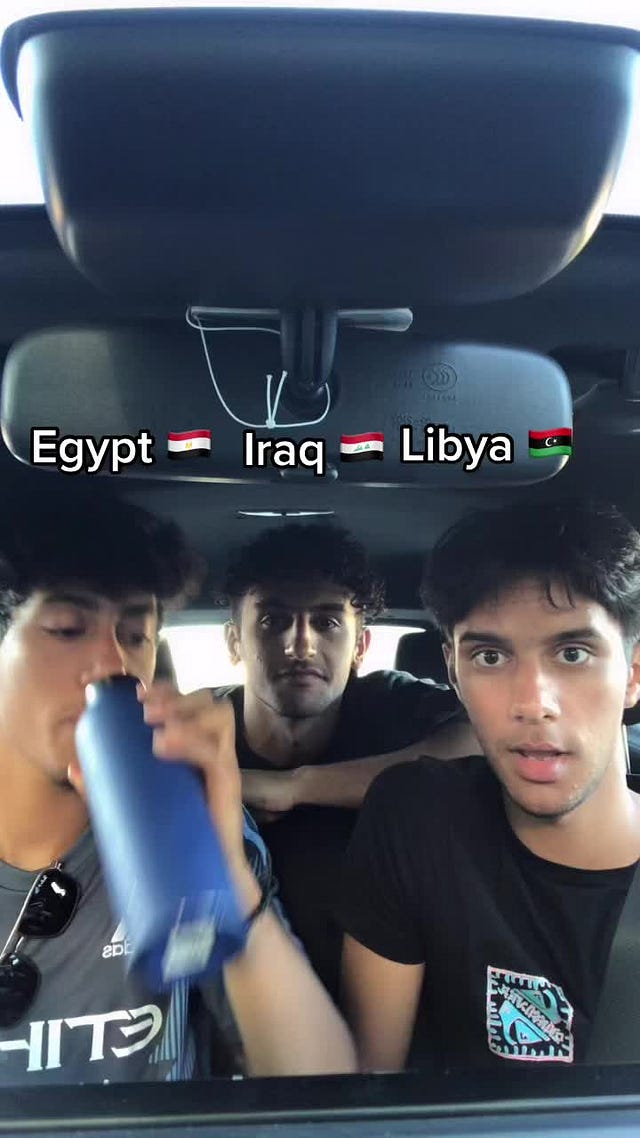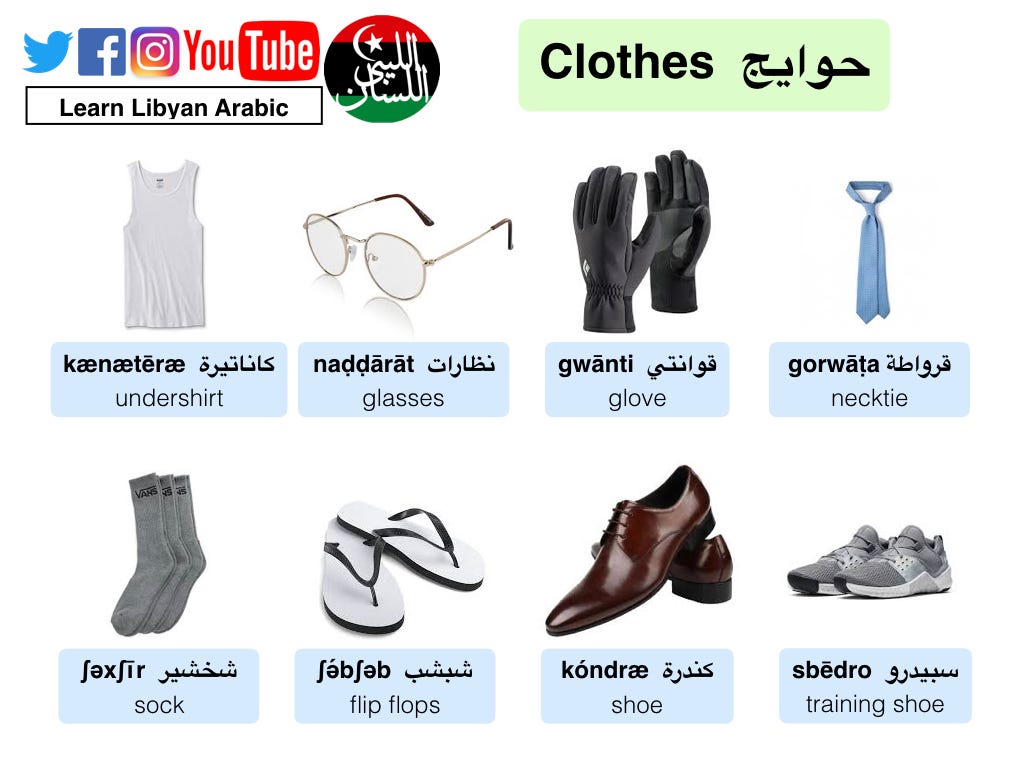Resources to learn Libyan Arabic
+ good music, books and more!
Ahlan everyone!
Now I know that because Libya is a smaller country, it can be difficult to find resources that teach Libyan Arabic, and sometimes it can be difficult finding Libyan things at all.
So, I have compiled a list of resources I use to learn Libyan Arabic and Arabic in general. Please take a look and as always, comment below any suggestions you have for either this topic, or for this newsletter in general. And make sure to subscribe to get more updates from me!
Libyan Arabic
YouTube Channels
Learn Libyan Arabic - I remember when I first discovered this YouTube channel and I was so hyped about it. The owner used to upload pretty consistently and the videos were all super informative. Unfortunately, he stopped uploading about 3 years ago at this point, and he also stopped engaging on his other social medias. We can only hope and pray that he is doing well. His videos are still a goldmine, so go check them out! Here are links to his Twitter and Reddit as well.
Libyan Arabic Lessons by Adel - I love Adel!! He is the only other YouTuber who uploads Libyan Arabic Lessons and he has been uploading weekly for the past year and a half now. From what I can tell, he mixes the Eastern and Western dialects. He is always constantly updating the format of his videos and he is very responsive to viewer feedback. Please go and like, subscribe, and comment on his videos! I really appreciate all of his lessons and I am sure you will too.
Astafeed - Learn Tunisian Arabic - This channel is dedicated to Tunisian Arabic. I use it as a supplement to the Libyan Arabic lessons provided by the other two channels I discussed, but I do not solely learn from it. Libyan and Tunisian have similar rhythms, but the words and pronunciations are pretty different in my opinion. What’s tough about Libyan is that it is very distinct from the other Arabic dialects in accent, in pronunciation, in words, and in rhythm. You really have to only consume Libyan resources in order to get fluent in Libyan. But I do like using Tunisian Arabic resources to help learn about verbs and how to structure sentences. Any resource helps and I think Tunisian resources are way more helpful than others of other dialects.
Leçons Tunisien - This is another Tunisian Lessons channel. However, this one is entirely in French. I know French so I obviously find it helpful lmao. If you have the slightest understanding of French and/or a slight understanding of Arabic, I don’t think it would be too hard to follow the lessons because they’re very clear cut. And hey, you’ll be learning French as well as Arabic from here!
YouTube Channels (Entertainment)
Here is a list of Libyan YouTubers and channels that are for entertainment. They generally do not have English subtitles or any subtitles for that matter. However, I find that it is important to hear the language as well as practice it. Regardless of region, I feel that Libyans have a very distinct rhythm and pronunciation that the other countries may have similarities with, but definitely do not share.
Rahalista - Rahalista!!! We all know who he is. He is a travel blogger from Benghazi and arguably the most famous YouTuber to come from Libya. I enjoy his travel vlogs throughout the world, and he also makes sure to highlight different places within Libya as well. Some videos may have English subtitles, but the majority of his videos do not. If you are looking to learn Eastern Libyan, this is the channel for you.
Taha Jawashi - Taha Jawashi is a photographer from Libya and he has settled in Spain. I believe he is from Western Libya. His videos consist of him speaking on any topic regarding culture, people, and places. He talks a lot about his life and experiences as well. Most of his videos don’t have English subtitles but the videos are produced very well, and just listening and watching the images on screen helps. Like I said earlier, any resource helps.
Tariq Elmeri - Tariq Elmeri hosts the Damiri podcast in which he hosts and interviews different successful/famous Libyans on their livelihoods. At least, I believe all of his interviewees are Libyans. Again, most of his videos do not have subtitles. I find the interviews very entertaining and informative- when I can understand them lol.
My kitchen libya - Love her, adore her, cherish her. This is just a cooking YouTube channel and she uploads very very consistently. She sounds like she is Western Libyan and most of her videos don’t have subtitles as well. But her food looks great and I am definitely learning something.
Libyan Tray - Another Libyan cooking channel. She speaks very clearly and it is easy to follow the recipes if you know the basic cooking terminology. I don’t think I’ve seen any subtitles on her videos though. Again, any resource is helpful, and it’s especially helpful when you’re completely immersed in the language.
أرشيف جوهر علي and جوهر علي - Both channels are owned by the same journalist. He uploads the episodes from the game show he is on and from his TV news program. He also has uploaded videos of him discussing different things such as history or pop culture. Zero subtitles on any of his videos as far as I am aware. I still watch the videos or have them on in the background even if I don’t understand anything.
Journey of Hope Libya - This is a channel that is dedicated to showcasing all parts of Libya and interviewing the people in those different parts. There are no subtitles, but the video are very calming and I enjoy seeing the scenery, drone shots, and learning about Libya from the tidbits of Arabic dialogue I can understand.
Tabadul Channel - This is just a Libyan news channel but they have hundreds of older videos that showcase life in Libya. I enjoy the markets playlist where the interviewer will go and interview shoppers or shopkeepers. Most of the videos in the playlist are just following the shopkeeper as they showcase what they’re selling in their shop, but there are a few videos of them being actually interviewed by someone and being put on the spot with hard hitting questions. Either way, I enjoy this playlist the most because you learn a lot of everyday vocabulary from seeing them demonstrate what is around. Zero subtitles to be found on this channel though.
Twitter / X
I love Twitter for language learning because you can access any part of the world and find out what people are talking about in that part of the world. Twitter is how I learned and became fluent in French lol.
Libyan Words, Libyan Epigrams, Libyan Tales, and Libyan Collective are all owned by the same person. They also each have their own Instagram account. They basically all share words, phrases, and stuff about Libyan culture. These accounts should be your starting points if you want to learn Libyan Arabic.
Learn Libyan Arabic - I put his YouTube channel up above and I am just putting his Twitter down here again.
أمثال ليبية is a twitter account that publishes Libyan sayings. They haven’t posted since 2017 but they have hundreds of tweets to go through.
I also recommend you all search for Arabic dialect challenges on YouTube, Instagram, and other social media. Some of them will have Libyans featured and you will be able to learn a word here and there.
 Tiktok failed to load.
Tiktok failed to load.Enable 3rd party cookies or use another browser
I think this is a pretty exhaustive list so far. Please recommend any other resources you have! In the future, I will definitely make more posts with more resources!!
📖Words of the Day📖
To start off our Libyan Arabic learning journey, here are some words for the day!
🎶Reggae, Hip-hop, Pop, and other Tunes 🎶
Ya Habiba Leish Al-Nesyan - White Bird Band (reggae)
Wainhom Al Ashab - Najib El Housh (reggae)
Gher Guli - DONBAYA (pop)
Gharbali - Issa Bendardaf & Saad Mahmoud (traditional, hip-hop)
1,000,000 YEARS - Volcano (hip-hop)
TARANIN - AMAKA (Tamahaq (Tuareg))
و احني خيرنا - Ahmed Alrgeby & White Boy & DJ REO (hip-hop)
Elzman Al9asi - Fatma Trablseya (traditional)
Had Hdoda - Ali Alabedi (pop)
📚Literature 📚
Chewing Gum - Mansour Bushnaf
Chewing Gum is a story built around the relationship between Fatma and Mukhtar. Fatma leaves Mukhtar and enters a life of prostitution, while Mukhtar stays infatuated with the thought of her for the next 10 years. Fatma is the real lead in this story as her journey is traced. The story is also satirical in its quest to understand how a society runs under a repressive dictatorship. It highlights and depicts all that is beneath the eye at first glance.
Translating Libya: The Modern Libyan Short Story - Ethan Chorin
Translating Libya presents the country through the eyes of sixteen Libyan short story writers and one American diplomat. Intrigued by the apparent absence of 'place' in modern Libyan short fiction, Ethan Chorin resolved to track down and translate stories that specifically mention cities and landmarks in Libya. The stories trace the influence of the ancient Romans, the later Italian occupation and the current influx of foreign workers from Africa and further afield. The authors open a window on today's Libya - a rapidly urbanizing country with rich oil reserves, recently renewed diplomatic relations with the West and a nascent tourist industry based on its well-preserved ancient cities. This is a unique introduction to a country that has for some time been 'off the beaten path'. (Book description from Amazon.com)
Al-Agaila: The Camp of Suffering, A Boy's Tale - Ali Hussein
This book is about the Al-Agaila concentration camp in Libya during the Mussolini era, a generally forgotten piece of history. Sixty five thousand people died in these camps. Half of Cyrenaica’s population were marched to these camps under the heat of the sun during the day, and in the freezing desert weather by night and if anybody lagged behind, they were to be shot. Hundreds died of thirst during the trek. The story follows Salem who was taken to this camp with his family and witnesses the atrocities the Italians committed. The second half of the book follows his life in Benghazi, how he was haunted by his experiences and they shape how he interacts with the world around him.




